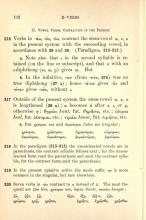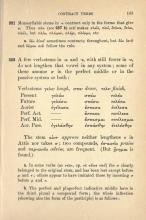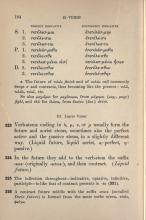316. Verbs in -άω, -έω, -όω contract the stem vowel -α-, -ε-, -ο- in the present system with the succeeding vowel, in accordance with §§ 29 and 30. (For paradigms see, §§ 313 – 315.)
a. Note also that -ι- in the second syllable is retained (on the line or subscript), and that -ο- with an ι-diphthong (-ει, -οι, -ῃ) gives -οι.
b. But, in the infinitive, -ειν (from -ε-εν, § 274) was no true diphthong (§ 27.a); hence -ά-ειν gives -ᾶν and ό-ειν gives -οῦν, without -ι-.
317. Outside of the present system the stem vowel -α-, -ε-, -ο- is lengthened (§ 28.a); -α- becomes -ᾱ- after -ε-, -ι-, or -ρ-, otherwise -η-.
θηράω (hunt), future θηρᾱ́σω, etc.
ῑ̓άομαι (heal), future ῑ̓ᾱ́σομαι, etc.
τῑμάω, (honor), future τιμήσω, etc.
a.χράομαι (use) and ἀκροάομαι (listen) are irregular.
| χράομαι | χρήσομαι | ἐχρησάμην | κέχρημαι |
| ἀκροάομαι | ἀκροᾱ́σομαι | ἠκροᾱσάμην | ἠκρόᾱμαι |
318. In the paradigms (§§ 313 – 315) the uncontracted vowels are in parenthesis, the contract syllable follows next; for the uncontracted form read the parenthesis and omit the contract syllable, for the contract form omit the parenthesis.
319. In the present optative active the mode suffix -ιη- is more common in the singular, but rare elsewhere.
320. Seven verbs in -άω contract to -η instead of -ᾱ. The most frequent are ζάω (live), χράομαι (use), διψάω (thirst), πεινάω (hunger).
| ζῶ, | ζῇς, | ζῇ, | ἔζης, | ἔζη, | ἐζῆτε, | ζῆν |
| χρῶμαι, | χρῇ, | χρῆται, | ἐχρῆτο, | ἐχρῆσθε, | χρῆσθαι |
321. Monosyllabic stems in -ε contract only in the forms that give -ει. Thus πλε- (see § 257.b) (sail) makes πλεῖς, πλεῖ, ἔπλεις, ἔπλει, πλεῖν, but πλέω, πλέομεν, πλέῃς, πλέοιμι, etc.
a. δέω (bind) sometimes contracts throughout, but δέω (lack) and δέομαι (ask) follow the rule.
322. A few verb-stems in -α and -ε, with still fewer in -ο, do not lengthen that vowel in any system; some of these assume -σ- in the perfect middle or in the passive system or both.
|
γελα- laugh |
σπα- draw |
τελε- finish |
|
| Present | γελάω | σπάω | τελέω |
| Future | γελάσω | σπάσω | τελέσω |
| Aorist | ἐγέλασα | ἔσπασα | ἐτέλεσα |
| Perf. Act. | --- | ἔσπακα | τετέλεκα |
| Perf. Mid. | --- | ἔσπασμαι | τετέλεσμαι |
| Aor. Pass. | ἐγελάσθην | ἐσπάσθην | ἐτελέσθην |
The stem αἰνε- (approve) neither lengthens -ε- in Attic nor takes -σ-; two compounds, ἐπ-αινέω (praise) and παρ-αινέω (advise), are frequent. (But ᾔνημαι is found.)
a. In some verbs (as τελε-, end, cp. τὸ τέλος) the -σ- clearly belonged to the original stem, and has been lost except before -μ- and -τ-; others appear to have imitated these by inserting -σ- before -μ- and -τ-.
b. The perfect and pluperfect indicative middle have in the 3rd plural a compound form; the whole inflection (showing also the form of the participle) is as follows.
| Middle Voice | |||
| Perfect Indicative | Pluperfect Indicative | ||
| Sing. | 1. | τετέλεσ-μαι | ἐτετελέσ-μην |
| 2. | τετέλε-σαι | ἐτετέλε-σο | |
| 3. | τετέλεσ-ται | ἐτετέλεσ-το | |
| Plur. | 1. | τετελέσ-μεθα | ἐτετελέσ-μεθα |
| 2. | τετέλε-σθε | ἐτετέλε-σθε | |
| 3. | τετελεσ-μένοι εἰσί | τελεσ-μένοι ἦσαν | |
| Dual | 2. | τετέλε-σθον | ἐτετέλε-σθον |
| 3. | τετέλε-σθον | ἐτετελέ-σθην | |
c. The future of τελέω (finish) and of καλέω (call) commonly drops -σ- and contracts, thus becoming like the present.
τελῶ, τελεῖς, τελεῖ, etc.
So also μαχοῦμαι for μαχέσομαι, from μάχομαι (μαχ-, μαχε-) fight, and ἐλῶ for ἐλάσω, from ἐλαύνω (ἐλα-) drive.



